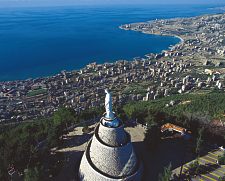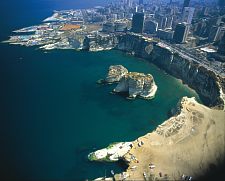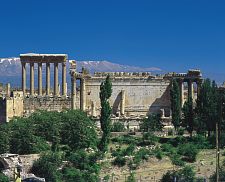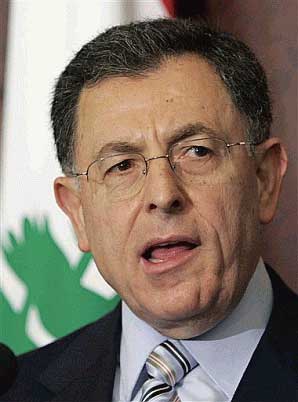|





| |
The Seven Steps of H.E. Prime Minister Fuad Siniora’s Plan
August 2006
An immediate and comprehensive cease-fire and a declaration of agreement on
the following issues:
- An undertaking to release the Lebanese and Israeli prisoners and detainees
through the ICRC.
- The withdrawal of the Israeli army behind the Blue Line, and the return of
the displaced to their villages.
- A commitment from the Security Council to place the Shabaa Farms area and
the Kfarshouba Hills under UN jurisdiction until border delineation and
Lebanese sovereignty over them are fully settled. While in UN custody, the
area will be accessible to Lebanese property owners there. Further, Israel
surrenders all remaining landmine maps in South Lebanon to the UN.
- The Lebanese government extends its authority over its territory through
its own legitimate armed forces, such that there will be no weapons or
authority other than that of the Lebanese state as stipulated in the Taef
national reconciliation document.
- The UN international force, operating in South Lebanon, is supplemented
and enhanced in numbers, equipment, mandate and scope of operation, as needed,
in order to undertake urgent humanitarian and relief work and guarantee
stability and security in the south so that those who fled their homes can
return.
- The UN, in cooperation with the relevant parties, undertakes the necessary
measures to once again put into effect the Armistice Agreement signed by
Lebanon and Israel in 1949, and to insure adherence to the provisions of that
agreement, as well as to explore possible amendments to or development of said
provisions, as necessary.
- The international community commits to support Leabnon on all levels, and
to assist it in facing the tremendous burden resulting from the human, social,
and economic tragedy which has afflicted the country, especially in the areas
of relief, reconstruction and rebuilding of the national economy.
Prime Minister Saniora's address to the Rome conference
August 2006
I would like first to express our deep condolences to the Secretary General Mr.
Kofi Anan and to all the countries to whom these Observers of UNIFL belong and
who got killed yesterday by Israeli fire in Southern Lebanon.
I would like to thank my friend, Prime Minister Romano Prodi and the Italian
government for hosting this critically important and timely meeting in Rome
today. Little did we know when we last met here toward the end of June that we
would be meeting again so soon and in such dire circumstances!
Only ten months ago, at our core group meeting in New York, we talked of
economic and institutional reform measures to help the Lebanese economy achieve
its growth potential, promote sustainable social and economic development, and
the enhancement of productive jobs. We spoke of a comprehensive macroeconomic
vision to rejuvenate the economy and resolve our debt overhang. We stated that
the support of the international community was paramount to the rebirth of our
country, and that your continued support was absolutely crucial for the Lebanese
experience of democracy to succeed in our part of the world, and warned of dire
consequences for us all if we failed. We talked of challenges and opportunities…
Then just three months ago, I addressed the Security Council in New York. There
I spoke of the historic strides taken on the road to a self-governing, stable,
democratic and prosperous Lebanon. I affirmed the priority national issue being
the liberation of the still occupied Shebaa Farms, the handover of Lebanese
detainees in Israeli prisons, and the need to put an end to the long history of
incursions and violations of Lebanese territory by Israel. I also confirmed the
state’s natural obligation to be the sole provider of security to all its
citizens and residents, and its exclusive right to carry arms and exercise its
full authority throughout the country in accordance with the Taef national
reconciliation pact of 1989. I also pleaded for a heightened interest by the
international community in order to empower the Lebanese government, enabling it
to move quickly in its economic social and political reform program, and
alleviating the feelings of hopelessness, despair, and pervasive sense of
humiliation in the region, and for serious cooperation, still a top priority, to
achieve a just and lasting peace between Israel and the Palestinians and the
Arab world, as expressed in the Beirut Arab Summit peace initiative in 2002,
which would contribute to the cause of democracy in the Arab and Muslim worlds.
How long ago that all seems now….
Now we talk only of death and war, destruction and dispossession, casualties and
suffering, displacement and desolation.
You are all aware that two weeks of a continuously escalating Israeli onslaught
on Lebanon have totally ravaged our country: the toll in terms of human life has
reached tragic proportions, and continues to mount: over 400 killed and 2000
injured so far, one third of them children under 12; almost a million people, or
25% of the population have been displaced; (try to imagine what would happen if
a quarter of your populations were forced to flee their homes with only the
clothes on their backs); in some areas, hospitals have been crippled and are
unable to cope with the casualties; there are shortages of food and medical
supplies; homes, factories, and warehouses have been completely destroyed; roads
severed , and bridges smashed; UN facilities , army barracks, and posts of Joint
Security Forces shelled; a civil defense unit wiped out; power supplies and fuel
depots bombarded causing devastating environmental damage on the eastern shore
of the Mediterranean; storage tanks ablaze; television aerials crushed; foreign
nationals fleeing; air, land and sea blockades enforced. In short, ladies and
gentlemen, this is the story of a country torn to shreds by destruction,
displacement, dispossession, despair and death; the story of senseless human
suffering. And as I speak, the trauma, the desperation, the grief and the daily
massacres and atrocities go on. More limbs lost, more widows, more motherless
children, more orphans, more defenseless people dying.
Before I boarded the helicopter in the besieged and severely bombarded city of
Beirut, I visited one of the hospitals crowded with injured civilians, and
listened to their cries of pains, fears and uncertainties. I need not tell you
how moving that experience was, but I drew strength from the resilience of my
people to come to you determined to strive so that their agony is over.
Excellencies, ladies and gentlemen, no government can survive on the ruins of a
nation.
How long will it take to heal the human, social, psychological, and economic
scars, and at what cost? How long and at what cost to rebuild roads, bridges,
homes? Before we forget those who have perished under the weight of Israeli
bombs? What future other than one of fear, frustration, financial ruin and
fanaticism can stem from the rubble?
Is the value of human life less in Lebanon than that of citizens elsewhere? Are
we children of a lesser God? Is an Israeli teardrop worth more than a drop of
Lebanese blood?
Can the international community continue to stand by while such callous
retribution by the state of Israel is inflicted upon us?
Will innocent civilians, churches, mosques, orphanages, relief supplies under
Red Cross escort, people seeking shelter or fleeing their homes and villages
continue to be the casualties of this barbaric and senseless war?
Is this what is called legitimate self-defense? Is this the price we pay for
aspiring to build our democratic institutions? Is this the message of support
for the country of diversity, freedom and tolerance?
Jan Egeland, U.N. Under-Secretary for Humanitarian Affairs and Emergency Relief
Coordinator has, after visiting affected area in the suburbs of Beirut, called
the indiscriminate bombing a breach of humanitarian law, which is clear on the
supreme obligation to protect civilians during hostilities. This obligation is
also enshrined in the Rome Treaty establishing the International Criminal Court
which restates the facts that, under international law, constitute war crimes.
Yes, the indiscriminate shelling of cities constitutes a foreseeable and
unacceptable targeting of civilians. Similarly, the bombardment of sites with
alleged military significance, resulting invariably in the killing of innocent
civilians, is, under international law, unjustifiable and criminal.
Israel cannot go on indefinitely disregarding international law. It must be made
to pay, and we shall commence legal proceedings and spare no avenue to make
Israel compensate the Lebanese people for the barbaric destruction it has
inflicted and continues to inflict upon us. How, though, do you put a value to
human life? What value do you place on lost limbs?
While my calls for an immediate humanitarian cease-fire have gone unheeded, I
have declared Lebanon a disaster-stricken country in urgent need of humanitarian
assistance. My Government, which had no advance knowledge of the Hezbollah
crossing of the Blue Line and abduction of two Israeli soldiers and has
disavowed it, condemns in the strongest possible terms the violent Israeli
response and its aggression in contravention of international laws, conventions,
and norms. It also rejects the claim that this aggression is in the context of
the legitimate right to self-defense. The Government has also reaffirmed the
commitment of Lebanon to abide by international resolutions and its
determination to preserve its independence, sovereignty, and territorial
integrity. It is also committed to fully respect the Blue Line. It also warned
last week that the continuation of the destruction and the killing perpetrated
by Israel will only aggravate the problem and threaten international peace and
security, especially in the Middle East. It also reaffirmed its responsibility
in safeguarding the country and its citizens, and its right and duty to extend
that authority over the entire territory.
On behalf of the valiant people of Lebanon, from Beirut, Baalbeck, and Byblos,
to Tyre, Sidon and Qana, to Tripoli, Zahle, Jamhour and Becharre, to the 21
villages at the southern border, declared a no-go zone by Israel, to the people
of each and every town and village suffering now as we speak, I call upon you
all to respond immediately, without reservation or hesitation, to my appeal for
an immediate cease-fire, and provide urgent humanitarian assistance to our
war-stricken country. A new Marshall plan must then be set in motion in order to
help Lebanon recover as quickly as possible from the crippling effects of this
unjustified onslaught valued in billions of US Dollars which is for the seventh
time deliberately targeting and disabling our economy and civilian
infrastructure.
The killing must stop! Now! We must work together for peace. We have seen
previous Israeli aggressions on Lebanon, in 1969, ‘78, ’82, ’93, ’96, and ’99.
They have achieved none of their stated aims. This must be the end. Returning to
the status quo ante would be futile. In the name of the people of Lebanon, I
call upon you all to help put an end to this human tragedy. I firmly believe
that this can be achieved in the following manner:
- An immediate and comprehensive cease-fire and a declaration of agreement on
the following issues:
a- An undertaking to release the Lebanese and Israeli prisoners and detainees
through the ICRC.
b- The withdrawal of the Israeli army behind the Blue Line, and the return of
the displaced to their villages.
c- A commitment from the Security Council to place the Shebaa Farms area and the
Kfarshouba Hills under UN jurisdiction until border delineation and Lebanese
sovereignty over them are fully settled. While in UN custody, the area will be
accessible to Lebanese property owners there. Further, Israel surrenders all
remaining landmine maps in South Lebanon to the UN.
d- The Lebanese government extends its authority over its territory through its
own legitimate armed forces, such that there will be no weapons or authority
other than that of the Lebanese state as stipulated in the Taef national
reconciliation document.
e- The UN international force, operating in South Lebanon, is supplemented and
enhanced in numbers, equipment, mandate and scope of operation, as needed, in
order to undertake urgent humanitarian and relief work and guarantee stability
and security in the south so that those who fled their homes can return.
f- The UN, in cooperation with the relevant parties, undertakes the necessary
measures to once again put into effect the Armistice Agreement signed by Lebanon
and Israel in 1949, and to insure adherence to the provisions of that agreement,
as well as to explore possible amendments to or development of said provisions,
as necessary.
g- The international community commits to support Lebanon on all levels, and to
assist it in facing the tremendous burden resulting from the human, social and
economic tragedy which has afflicted the country, especially in the areas of
relief, reconstruction and rebuilding of the national economy.
With goodwill and determination on all sides, the above can provide us with the
necessary elements to rebuild our fractured country, reemerging as a unified
Arab democratic country, a beacon of freedom, diversity and tolerance in the
region. It can also be a stepping stone to achieving a just and comprehensive
peace between the peoples of the Middle East. The significance of Lebanon as a
model cannot be preserved and fostered if turned into a battlefield for the wars
of others.
Excellencies, ladies and gentlemen
We owe our people an honorable way out of this war. We owe our people, with your
support, a solution that will not allow any further destruction and will help us
rebuild our nation and strengthen our democracy.
In conclusion, let me recall what the Roman historian Tacitus said in this great
city two thousand years ago and which describes well what Israel is doing to
Lebanon and the region today, and I quote: "They create a desolation and
call it peace"
Our choice is clear.
We have chosen life.
We did not come to Rome only to ask for relief and support.
We came to be heard and to cry out loud our nation's right to life.
We shall not compromise our just cause or our national interests.
We are here to bear witness to our unity as a people.
We have overcome wars and destruction over the ages.
We shall rise up again.
Let that be your choice too.
Do not allow desolation to prevail.
Source: The Presidency of the Council of Ministers (http://www.pcm.gov.lb/)
|